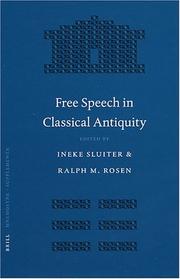| Listing 1 - 2 of 2 |
Sort by
|
Book
ISBN: 9780198788201 0198788207 9780191092305 0191092304 0191092312 019183016X Year: 2018 Publisher: New York, NY : Oxford University Press,
Abstract | Keywords | Export | Availability | Bookmark
 Loading...
Loading...Choose an application
- Reference Manager
- EndNote
- RefWorks (Direct export to RefWorks)
Public speech was a key aspect of politics in Republican Rome, both in theory and in practice, and recent decades have seen a surge in scholarly discussion of its significance and performance. Yet the partial nature of the surviving evidence means that our understanding of its workings is dominated by one man, whose texts are the only examples to have survived in complete form since antiquity: Cicero.This collection of essays aims to broaden our conception of the oratory of the Roman Republic by exploring how it was practiced by individuals other than Cicero, whether major statesmen, jobbing lawyers, or, exceptionally, the wives of politicians. It focuses particularly on the surviving fragments of such oratory, with individual essays tackling the challenges posed both by the partial and often unreliable nature of the evidence about these other Roman orators-often known to us chiefly through the tendentious observations of Cicero himself-and the complex intersections of the written fragments and the oral phenomenon. Collectively, the essays are concerned with the methods by which we are able to reconstruct non-Ciceronian oratory and the exploration of new ways of interpreting this evidence to tell us about the content, context, and delivery of those speeches. They are arranged into two thematic Parts, the first addressing questions of reception, selection, and transmission, and the second those of reconstruction, contextualization, and interpretation: together they represent a comprehensive overview of the non-Ciceronian speeches that will be of use to all ancient historians, philologists, and literary classicists with an interest in the oratory of the Roman Republic.

ISBN: 9004139257 9786610915354 9047405684 1280915358 1429408413 9789004139251 9781429408417 9781280915352 6610915350 9789047405689 Year: 2004 Volume: 254 Publisher: Leiden Brill
Abstract | Keywords | Export | Availability | Bookmark
 Loading...
Loading...Choose an application
- Reference Manager
- EndNote
- RefWorks (Direct export to RefWorks)
This book contains a collection of essays on the notion of “Free Speech” in classical antiquity. The essays examine such concepts as “freedom of speech,” “self-expression,” and “censorship,” in ancient Greek and Roman culture from historical, philosophical, and literary perspectives. Among the many questions addressed are: what was the precise lexicographical valence of the ancient terms we routinely translate as 'Freedom of Speech,' e.g., Parrhesia in Greece, Licentia in Rome? What relationship do such terms have with concepts such as isêgoria , dêmokratia and eleutheria ; or libertas , res publica and imperium ? What does ancient theorizing about free speech tell us about contemporary relationships between power and speech? What are the philosophical foundations and ideological underpinnings of free speech in specific historical contexts?
Classical literature --- Politics and literature --- Law and literature --- Freedom of speech in literature --- Freedom of speech --- Political oratory --- Oratory, Ancient --- History and criticism --- History --- Politics --- Littérature ancienne --- Politique et littérature --- Droit et littérature --- Liberté d'expression --- Eloquence politique --- Eloquence antique --- Congresses --- Histoire et critique --- Congrès --- Histoire --- Literature --- Literature and politics --- Parliamentary oratory --- Political speaking --- Oratory --- Politics, Practical --- Public speaking --- Rhetoric --- Literature and law --- Free speech --- Liberty of speech --- Speech, Freedom of --- Civil rights --- Freedom of expression --- Assembly, Right of --- Freedom of information --- Intellectual freedom --- Political aspects --- Law and legislation --- Greece --- Oratory [Ancient ] --- To 500 --- Rome --- Congresses. --- Classical literature - History and criticism - Congresses. --- Politics and literature - Greece - Congresses. --- Law and literature - History - To 500 - Congresses. --- Politics and literature - Rome - Congresses. --- Freedom of speech in literature - Congresses. --- Freedom of speech - Greece - Congresses. --- Political oratory - Greece - Congresses. --- Freedom of speech - Rome - Congresses. --- Political oratory - Rome - Congresses. --- Oratory, Ancient - Congresses.
| Listing 1 - 2 of 2 |
Sort by
|

 Search
Search Feedback
Feedback About UniCat
About UniCat  Help
Help News
News